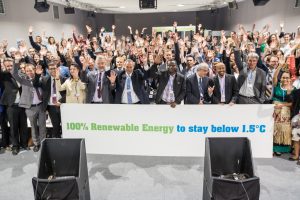Very little is known about Nigeria’s newly launched presidential solar homes system. Its implementation strategy is dangerously hushed, promoters should open up on how it will work.
It is not entirely clear to the Nigerian public, beneficiary rural folks, and to an extent operators in the country’s emerging RE sector how the government plans to implement the new solar power scheme for rural homes it launched in January 2017.
The procurement and implementation details of this ‘presidential solar homes system’ have so far remained quite hidden to at least allow for productive appraisals by experts in solar PV deployment.
As was told, solar home solutions in the scheme would be installed in rural villages/homes, yet there are no information on how much money would be put into this project as capital costs, or how it will move from points to points, what time it would be completed, and how its execution would be evaluated and by who.
Without rudimentary statistics, the closest execution details available on the scheme was the disclosure of vice president, Prof. Yemi Osinbajo, during its launch in Wuna, a remote village on the sides of the country’s federal capital city Abuja, that 20,000 homes would be covered in it across Nigeria.
Osinbajo also said it was a pay-as-you-go system which beneficiary rural folks would eventually own after 36 months of constant payments. No one told journalists how much would be paid by these folks and on what basis.
Notwithstanding, it was however gathered that the scheme would be funded by the Niger Delta Power Holding Company (NDPHC) – a publicly owned power SPV created by the government to bridge the gap in Nigeria’s appalling public electricity supplies.
The scheme will also have a new department for RE in the NDPHC and a team in the office of the vice president manage it, while Azuri – a Cambridge UK based commercial provider of pay-go solar systems to rural off-grid communities will implement it.
In his remarks, Osinbajo further disclosed that the government in 2015 started talks with Azuri on the scheme during a power conference in the UK. He added that discussions progressed until a deal was hammered out.
At OGN, we welcome the scheme as part of the government’s decent attempts to provide electricity to millions of citizens not connected to the grid, but we are mindful of the fact that there was no public procurement process, at least known to the media, to allow for competitive bids.
We are also impressed that a commercial model has at least been adopted to implement the scheme, but we are concerned about the silence that surrounds its entire implementation method.
We also do not want to think the government may be taking this up as charity, not with the current remarkable impacts that commercial solar power supply has recorded.
Because we have seen a previous government solar power scheme for rural communities fail on the back of poor implementation strategies, we are therefore calling out for openness in the execution of this scheme.
As rightly buttressed by the Director for Renewable and Rural Power Access Department in the ministry of power, Mr. Abayomi Adebisi, at an August 2015 inter-ministerial committee meeting on renewable energy action plan in Abuja, the previous scheme – ‘operation light up rural Nigeria’, of former president, Goodluck Jonathan, failed because communities had the impression that electricity came to them as a government charity, indicating there were no commercial frameworks to keep it running.
Now that the government has picked up another scheme, we expect it had studied the fault lines that led to the failure of the last one to avoid a repeat.
But above all, we want an open and ethical implementation of this scheme, starting with the disclosure of its costs, responsibilities of partners and beneficiaries, project implementation methods and timeline, and of course, agreed KPIs. That way, progress made on this would be constructively tracked.
We also expect above all, that partners in the ‘presidential solar homes system’ would appreciate how important it is for the RE industry and its growing operators in Nigeria, that they execute this scheme well and productively.
We are of the opinion that Nigeria cannot afford another failed communities’ solar power scheme. Indeed, another failure will in many ways affect the healthy growth trajectory already established by diligent indigenous RE operators.
Before this goes wrong again, we ask for transparent and resourceful approaches in executing the new scheme.





